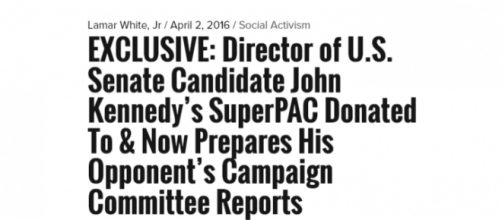Louisiana State Treasurer John Kennedy missed his second consecutive candidates' forum, causing the candidates to question if he was avoiding specific issues regarding the $1 billion budget deficit Louisiana faces for 2016 and $2 billion deficit for 2017.
Louisiana's 'spending' problem is actually an uncollected revenue problem
Kennedy has been Treasurer of Louisiana since 1999 and campaigns on how frugal he, and not the state legislature, have been with state revenues for the last 15 years. However, pending budget cuts loom on the horizon and his popularity is decreasing.
He attacks the Governor to cut spending and not raise taxes, but then notes how the $1.1 billion in temporary exemption on hydraulic fracturing could be used to solve part of the rapidly approaching $3 billion shortfall. While he suggests Louisiana has a spending problem and not a revenue problem, the actual cause of the budget crisis isuncollected revenue from taxes on horizontal drilling.
The Treasurer has been under fire on two issues by Lamar White, Jr., who blogs as CenLamar from central Louisiana.One column, “Treasurer John Kennedy Lies About Jay Dardenne, Mocks Public Art, & Doesn’t Know the Law,” describes Kennedy’s criticism of Commissioner of Administration Jay Dardenne for installing sculptures at the new University Medical Center in New Orleans.
Current law requires 1% of a public building’s budget be set aside for art on any project valued over $2 million.
Kennedy uses state campaign funds for federal campaign
Previously, White uncovered and wrote a more concerning article regardingKennedy’s transparency in fundraising. The article is titled: “Director of U.S. Senate Candidate John Kennedy’s SuperPAC Donated to & Now Prepares His Opponent’s Campaign Report.” Kennedy has run unopposed for Treasurer since 1999. He ran previously for Senate as a Democrat against Senator David Vitter in 2004 and as a Republican against Mary Landrieu in 2008, losing both campaigns.
White describes the scenario that Kennedy started fundraising for the federal Senate race while he was running for State Treasurer in 2015.
Campaign laws prohibit mixing the funds raised for a state campaign with funds for a federal campaign. Since he did not have an opponent for his Treasurer’s race, donors would not have a reason to contribute to Kennedy and hewould not have a reason to run commercials, gaining exposure for his future Senate campaign.
White writes he discovered that Jason Redmond, who worked under Kennedy as Deputy State Treasurer and served as Executive Director of John Kennedy’s SuperPAC donated to and filed finance papers for Kennedy’s opponent in the 2015 Treasurer’s race.White notes that the opponent entered the race on Sep 8 with less than two months to campaign and raised less than $10,000 compared to the more than $2 million in Kennedy’s campaign war chest.
Kennedy won the race with 80% of the vote.
The legal issue is how Kennedy moved the money raised from his state Treasure campaign to his federal Senate campaign. Campaign rules are to refund the money to donors and ask them to contribute to the federal campaign. This gives donors an option not to fund Kennedy for Senate, should they be backing someone else.
While missing the candidates’ forums, Kennedy sent representatives who describe him as being transparent, yetRedmond has refused to answer White’s questions on the 2015 Treasurer campaign.
With a crowded Senate race comprised of 24 candidates, it seems only the ones with deep pockets are receiving media coverage during the forums. Additionally, several candidates have no declaration of their platforms, leaving voters to rely on hearsay and name recognition.
One candidate, however, has clearly defined his campaign objectives: former Mayor Charles Marsala. He has already proposed options to defund ISIS in Africa, reduce harmful algal blooms throughout America's waterways, and protect senior finances. Marsala is truly a unique candidate in acrowded Senate race.

